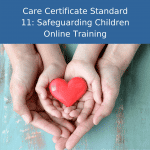Description
Forced Marriage Awareness (Safeguarding Course)
Forced marriage is a serious human rights violation that can have devastating consequences for victims. It is estimated that between 6,000 and 8,000 forced marriages of British citizens take place each year. This online Forced Marriage Awareness ( Safeguarding Course) will teach you:
- what forced marriage is,
- how to recognise the warning signs,
- the right actions to take to help protect the potential victim, and
- how to co-operate effectively with other agencies.
Safeguarding individuals at risk is of utmost importance, and this course will empower you to play an active role in prevention and intervention. Our focus on safeguarding principles and collaboration with relevant agencies will enable you to respond effectively in these sensitive situations.
- Developed by professionals
- Accredited by The CPD Accreditation Group
- 100% online, learn at your own time and pace
- Translates into over 100 different languages
- Instant certificate downloaded
This course has been designed to ensure that you understand Forced Marriage.
Course Outline:
Our Forced Marriage training course aims to increase your knowledge of forced marriage, including the signs and relevant legislation.
The key points covered in this course are:
- Defining forced marriage
- Signs of forced marriage
- Protection strategies
- Communicating with agencies
Module 1: Introduction to Forced Marriage
- Defining Forced Marriage
- Historical and cultural context
- Key statistics and prevalence
Module 2: Motives for Forced Marriage
- Exploring the reasons behind forcing someone into marriage
- Cultural, social, and familial factors
- Understanding power dynamics and control
Module 3: Impact on Victims
- Psychological, emotional, and physical consequences
- Effects on mental health and well-being
- Case studies and personal testimonies
Module 4: Honour Based Violence
- Understanding the concept of Honour Based Violence
- Relationship between Honour Based Violence and Forced Marriage
- Cultural norms and expectations
Module 5: Recognizing Signs of Forced Marriage
- Indicators and red flags
- Behavioral and physical signs
- Communication barriers and potential warning signs
Module 6: Taking Action to Safeguard Potential Victims
- Legal frameworks and legislation
- Reporting procedures and available support services
- Strategies for intervention and prevention
Module 7: Case Studies and Practical Scenarios
- Real-life examples and case studies
- Interactive exercises to apply knowledge and skills
- Ethical considerations and dilemmas
Module 8: Resources and Further Support
- Additional resources, websites, and helpline information
- Organizations providing assistance to victims of Forced Marriage
- Self-care strategies and support networks
By the end of this course, participants will have a comprehensive understanding of Forced Marriage, including its definition, motives, and impact on victims.
They will also be equipped with the knowledge and skills necessary to identify signs of Forced Marriage and take appropriate action to safeguard potential victims.
Learning Outcome
At the end of this course, you should be able to:
- Describe what a Forced Marriage is
- Identify some motives for forcing someone to marry another
- Understand the impact of Forced Marriage on victims
- Have an understanding of the concept of Honour Based Violence
- Be more aware of how to spot the signs of a Forced Marriage
- Know how to take action to try and safeguard a potential victim of Forced Marriage
Frequently Asked Questions
What is forced marriage?
Forced marriage is when someone is made to marry without giving their permission or against their will. It is wrong because people should have the right to choose who they want to marry. Forced marriage is different from an arranged marriage, where families help in finding a partner, but both people agree to the marriage.
Forced marriage happens in different cultures and countries, and it affects both men and women, but women and girls are often more affected. It is a form of abuse and goes against human rights. Many countries have laws against forced marriage because it is not fair or right.
Forced marriage is illegal in the UK. The Forced Marriage (Civil Protection) Act 2007 criminalizes forcing someone into marriage against their will, whether through coercion or threats. The law provides protection through Forced Marriage Protection Orders and specific criminal offenses, ensuring legal consequences for those involved.
The UK government is actively working to raise awareness, provide support to victims, and strengthen legislation to prevent forced marriage and protect individuals at risk. If you suspect forced marriage, it is important to report your concerns to the authorities to ensure the safety and well-being of those affected.
The Anti-social Behaviour, Crime, and Policing Act 2014 introduced specific criminal offenses related to forced marriage, ensuring that those responsible can face legal consequences, including imprisonment.
How do I get a forced marriage protection order?
To obtain a Forced Marriage Protection Order, you can take the following steps:
- Seek legal advice.
- Gather evidence.
- Contact the court.
- Complete the application.
- Attend the court hearing.
- Await the decision and implement the order.
What are the signs of forced marriage?
Signs of forced marriage can vary depending on the specific situation and individuals involved. However, some common indicators to be aware of include:
- Lack of consent: One or both parties express unwillingness or resistance to the marriage.
- Pressure or coercion: Manipulation, emotional blackmail, or threats from family members or community.
- Limited freedom: Restricted social interactions, controlled movements, or isolation from support networks.
- Sudden behavior changes: Noticeable shifts in demeanor, withdrawal, or signs of distress.
- Education disruption: Unexpected withdrawal from school or educational programs without a valid reason.
- Forced isolation: Restrictions on communication, confiscation of devices, or limited outside contact.
- Unexplained travel plans: Sudden, purposeless trips, especially to another country.
- Family history: Previous instances of forced marriage within the family or community.
- Age mismatch: Significant age differences, especially when one party is a minor.
- Expressed fears/concerns: Victims sharing worries or expressing fears about the impending marriage





